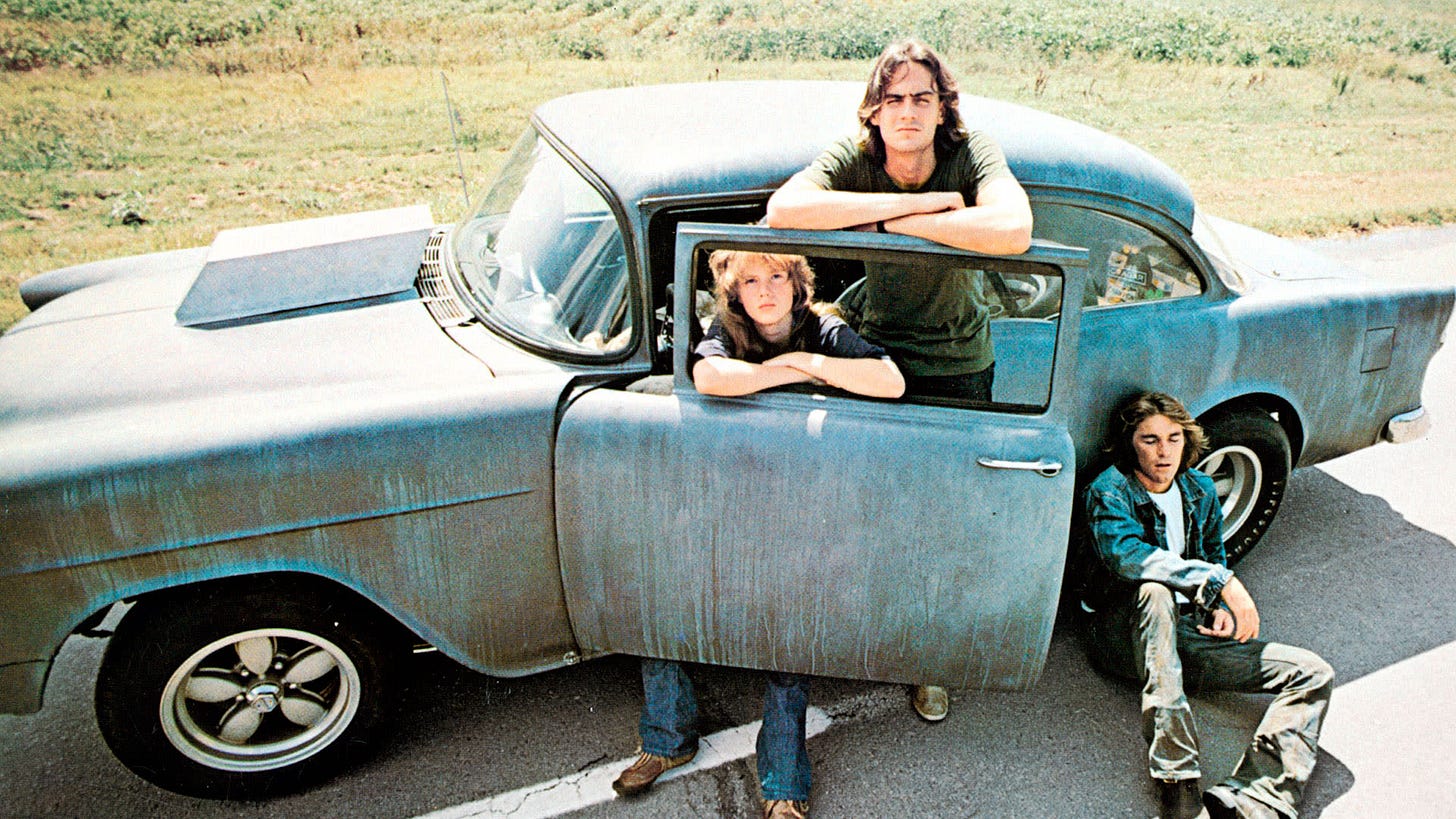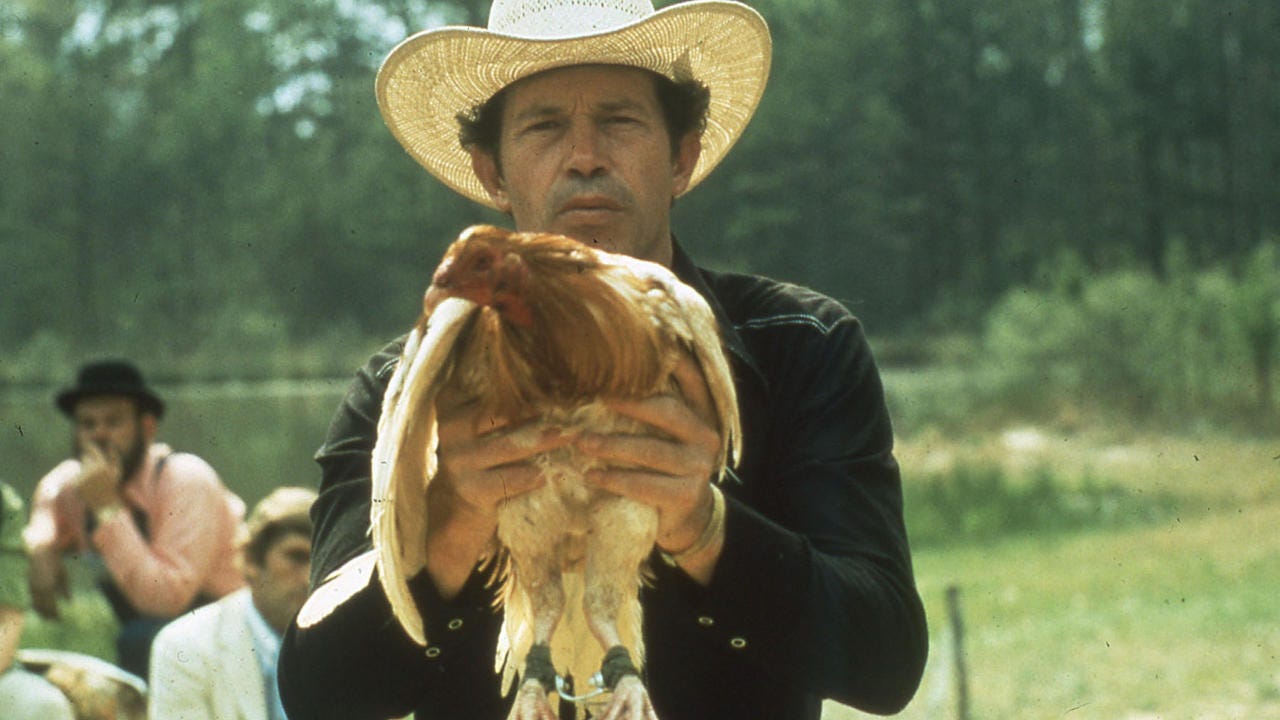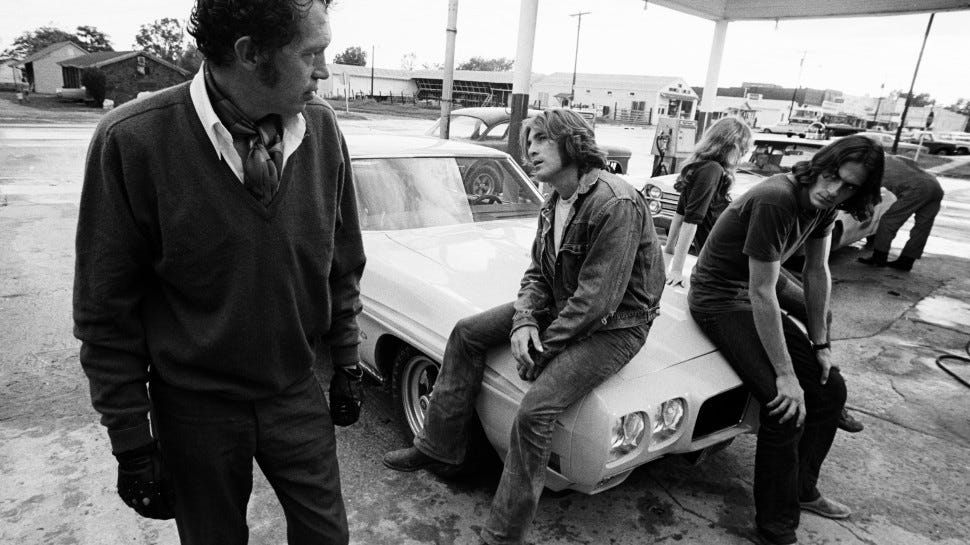Two-Lane Blacktop / Cockfighter
One of the earliest directors to come out in full swing from the unofficial Roger Corman film school was Monte Hellman. Whilst he was not as successful as peers such as Coppola or Bogdonavich, he has remained a cult favourite and released a number of low budget, independent films that stay true to his personal vision. Having made only 11 films his oeuvre is pretty minimal but incredibly consistent. Hellman was also an editor for a variety of films (both credited and not) which is clear when watching his films, pacing and rhythm play a huge role in his films. Often having short run times and removing absolutely everything that isn’t necessary to tell the story on screen.

Two-Lane Blacktop is most often considered his most acclaimed film, eventually getting selected for preservation in the National Film Gallery. Following up from that was an adaptation of a Charles Willeford novel; Cockfighter, which was less successful and Roger Corman claimed it was the only film he produced in the 70s that actually lost money. Cockfighter would eventually be rebranded as Born to Kill and made to look like an action/hicksplotation film - which it is very much neither. It differs very much from the typical Corman produced film in the sense that is very subdued and features a distinct lack of any exploitation tropes. Both these films feel spiritually connected, being road movies that permeate around drifters engaging in dangerous and precarious life styles as they roam across the United States.
Blacktop is most notable for featuring musicians Dennis Wilson and James Taylor as the lead duo named only as The Driver and The Mechanic. Most likely it wasn’t their intention but due to their inexperience their performances come off exceptionally blank - feeling like they have just been picked straight out of a Robert Bresson movie. Both actors are contrasted by Warren Oates’ absolutely electric performance as a mysterious Pontiac GTO driver; someone who seems to never tell the same story twice and loves to pick up hitchhikers, most likely so he doesn’t feel so alone whilst driving through the huge void of America. Together, along with Laurie Bird, they partake in drag races and seemingly drive from state to state without any plan or final destination in mind.
Cockfighter has a much more brutal concept, in which its titular fighting cocks attack each other in increasingly intense escalation. Some of these fights become genuinely hard to watch and just as nerve wracking as any genuine human fight you will see on screen. One can only assume that the fights were not staged as they looked incredibly real, which will no doubt put a decent amount of people off the film. Just like in Claire Denis’ No Fear No Die however, the violence that is shown through the cock fights only adds to a simmering tension that is increased with every fight. The audience gets more rowdy, the bets get bigger, the stakes are raised until you know that something must have to go wrong eventually. Despite this and Blacktop both being short films (90 and 100 minutes respectively) they manage to build up a large amount of dread in such a short span of time. Mostly due to the erratic nature of the characters and the lifestyles they lead.

Oates plays the lead in Cockfighter, except swapping out the loud mouth racer with something to prove for a silent, brooding cockfighter who has even more to prove. Frank (Oates) has taken a vow of silence until one of his cocks wins the fighting championship. His obsession to win, and consequently his new found silence, has seemingly had a dramatic impact on the relationships to both his family and his fiancee, crippling both of them to the point where it is uncertain if they will ever return, even after he has won his competition. I’d be interested in knowing if Michael Mann is a fan of this film. The cyclonic process of a skill and dedication to a singular task feels very much in line with his characters in films like Thief or Heat. It goes without saying that Oates is absolutely fantastic in this role. With such little dialog he is able to convey a vast amount of emotions, in both films he feels incredibly fragile and almost as if his character is about to either collapse or lash out at any given moment. Truly one of the most underrated character actors ever.
Speaking of Bresson, with both of these films Hellman creates what is potentially the closest an American filmmaker has got to replicating the style of the great French director, intentionally or not. James Taylor seldom says much in Blacktop and when he does, it is without urgency or any emotional depth. Some people may find this off putting but anyone who is a fan of A Man Escaped, Four Nights of a Dreamer etc will feel right at home. Not only is it the performances however, it is also in the way the characters move. Bresson has a fascination with the process of doing something. In Pickpocket the camera focuses heavily on the action of pickpocketing, with close and rapid cuts to put emphasis on that task, or whether it is the jousting sequence in Lancelot Du Lac which repetitive nature wears you down. Hellman does a similar thing with the Cockfighting, using repetition and extreme close ups of the bird to build intensity throughout the film.

Throughout these films Hellman explores the true, usually unseen, honest life of the rural drifter. Going from town to town, meeting the same faces (also drifters), only just managing to survive and most of all - not changing their lifestyle for absolutely anything. One could define these films as existential Americana, whilst they have this incredibly grounded sense of realism there is a sense of despair in each film. The characters are ultimately going nowhere with no real direction or plans. A tangible sense of isolation and alienation from modern life is omnipresent throughout every shot and crack in both of these films. Joy and happiness only comes from the most extreme activities - whether it be watching two roosters violently attack each other or risking one's own life drag racing on the track.
Blacktop feels like it is exploring the post counter culture societies of America. Where do the people of the “hippie generation” go after the turbulent era of the 60s and is there even any hope for them? Just in the same way that Easy Rider (and many of Hopper’s future films) looked at the death of the counter culture generation, Blacktop follows the same dynamic. However, Hopper had a much dramatic and nihilistic end to the era of free love and hope whereas Hellman’s film has no real end. There is no conclusion to dreaming, drifting and ultimately America itself. Cockfighter has the same feeling of being stuck in an endless cyclonic loop, although it feels more focused on the underbelly of Southern America, rural communities bonded together through these crazy, absurd violent spectacles. Where making the American Dream comes at such a cost of dedication, you could lose absolutely everything in the process.

Two-Lane Blacktop is most often considered his most acclaimed film, eventually getting selected for preservation in the National Film Gallery. Following up from that was an adaptation of a Charles Willeford novel; Cockfighter, which was less successful and Roger Corman claimed it was the only film he produced in the 70s that actually lost money. Cockfighter would eventually be rebranded as Born to Kill and made to look like an action/hicksplotation film - which it is very much neither. It differs very much from the typical Corman produced film in the sense that is very subdued and features a distinct lack of any exploitation tropes. Both these films feel spiritually connected, being road movies that permeate around drifters engaging in dangerous and precarious life styles as they roam across the United States.
Blacktop is most notable for featuring musicians Dennis Wilson and James Taylor as the lead duo named only as The Driver and The Mechanic. Most likely it wasn’t their intention but due to their inexperience their performances come off exceptionally blank - feeling like they have just been picked straight out of a Robert Bresson movie. Both actors are contrasted by Warren Oates’ absolutely electric performance as a mysterious Pontiac GTO driver; someone who seems to never tell the same story twice and loves to pick up hitchhikers, most likely so he doesn’t feel so alone whilst driving through the huge void of America. Together, along with Laurie Bird, they partake in drag races and seemingly drive from state to state without any plan or final destination in mind.
Cockfighter has a much more brutal concept, in which its titular fighting cocks attack each other in increasingly intense escalation. Some of these fights become genuinely hard to watch and just as nerve wracking as any genuine human fight you will see on screen. One can only assume that the fights were not staged as they looked incredibly real, which will no doubt put a decent amount of people off the film. Just like in Claire Denis’ No Fear No Die however, the violence that is shown through the cock fights only adds to a simmering tension that is increased with every fight. The audience gets more rowdy, the bets get bigger, the stakes are raised until you know that something must have to go wrong eventually. Despite this and Blacktop both being short films (90 and 100 minutes respectively) they manage to build up a large amount of dread in such a short span of time. Mostly due to the erratic nature of the characters and the lifestyles they lead.

Oates plays the lead in Cockfighter, except swapping out the loud mouth racer with something to prove for a silent, brooding cockfighter who has even more to prove. Frank (Oates) has taken a vow of silence until one of his cocks wins the fighting championship. His obsession to win, and consequently his new found silence, has seemingly had a dramatic impact on the relationships to both his family and his fiancee, crippling both of them to the point where it is uncertain if they will ever return, even after he has won his competition. I’d be interested in knowing if Michael Mann is a fan of this film. The cyclonic process of a skill and dedication to a singular task feels very much in line with his characters in films like Thief or Heat. It goes without saying that Oates is absolutely fantastic in this role. With such little dialog he is able to convey a vast amount of emotions, in both films he feels incredibly fragile and almost as if his character is about to either collapse or lash out at any given moment. Truly one of the most underrated character actors ever.
Speaking of Bresson, with both of these films Hellman creates what is potentially the closest an American filmmaker has got to replicating the style of the great French director, intentionally or not. James Taylor seldom says much in Blacktop and when he does, it is without urgency or any emotional depth. Some people may find this off putting but anyone who is a fan of A Man Escaped, Four Nights of a Dreamer etc will feel right at home. Not only is it the performances however, it is also in the way the characters move. Bresson has a fascination with the process of doing something. In Pickpocket the camera focuses heavily on the action of pickpocketing, with close and rapid cuts to put emphasis on that task, or whether it is the jousting sequence in Lancelot Du Lac which repetitive nature wears you down. Hellman does a similar thing with the Cockfighting, using repetition and extreme close ups of the bird to build intensity throughout the film.

Throughout these films Hellman explores the true, usually unseen, honest life of the rural drifter. Going from town to town, meeting the same faces (also drifters), only just managing to survive and most of all - not changing their lifestyle for absolutely anything. One could define these films as existential Americana, whilst they have this incredibly grounded sense of realism there is a sense of despair in each film. The characters are ultimately going nowhere with no real direction or plans. A tangible sense of isolation and alienation from modern life is omnipresent throughout every shot and crack in both of these films. Joy and happiness only comes from the most extreme activities - whether it be watching two roosters violently attack each other or risking one's own life drag racing on the track.
Blacktop feels like it is exploring the post counter culture societies of America. Where do the people of the “hippie generation” go after the turbulent era of the 60s and is there even any hope for them? Just in the same way that Easy Rider (and many of Hopper’s future films) looked at the death of the counter culture generation, Blacktop follows the same dynamic. However, Hopper had a much dramatic and nihilistic end to the era of free love and hope whereas Hellman’s film has no real end. There is no conclusion to dreaming, drifting and ultimately America itself. Cockfighter has the same feeling of being stuck in an endless cyclonic loop, although it feels more focused on the underbelly of Southern America, rural communities bonded together through these crazy, absurd violent spectacles. Where making the American Dream comes at such a cost of dedication, you could lose absolutely everything in the process.
